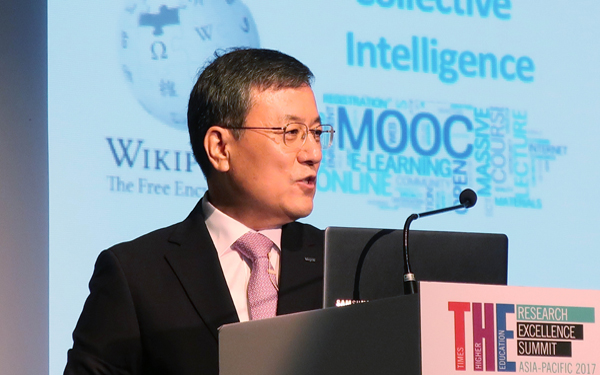people

(President Shin makes a keynote speech at the Times Higher Education Research Excellence Summit held in Taiwan on July 4.)
KAIST President Sung-Chul Shin stressed that innovations in education, research, and technology commercialization of universities are critical for responding to the transformations that the Fourth Industrial Revolution will bring about.
In his keynote speech at the Times Higher Education Research Excellence Summit held in Taiwan on July 4, he cited connectivity, superintelligence, and convergence in science and technology as three components the Fourth Industrial Revolution will pierce, saying the speed and breadth of the transformation will be beyond our imagination. He also presented megatrends in science and technology in the years to come and how KAIST is addressing the challenges and opportunities.
“It is imperative to foster creative young talents fluent in convergence, collaboration, and communication skills in the new era. To this end, we need to focus on whole brain education by enhancing basic education in science and engineering plus humanities and social studies,” he stressed. He also presented a Non-Departmental Education Track, which KAIST plans to implement from next semester. The track, designed to prepare students for the new industrial era, will focus on whole brain education including entrepreneurship and leadership education during the undergraduate period.
He also emphasized an effective new teaching methodology. “We need to develop various new teaching methods. The paradigm should shift from lecturer-centered to student-centered. KAIST is revising our curriculum to facilitate team-based, project-based learning and flipped learning,” he explained.
President Shin also pointed out that the educational goals for the next generation should be to sustain the value of people’s own thoughtfulness, wisdom, emotion, and caring against the advent of a new tribe of AI, dubbed Robo Sapiens. “Those traits add undeniable educational value that we should continue to pursue even in the era of Robo Sapiens,” he added.
As for research innovation, he emphasized inter- and multi-disciplinary collaborative research. “Especially, in addressing pressing global issues and big science, international collaboration will be very effective and crucial,” he said.
At the summit, convergence research projects currently underway at KAIST using emerging technologies such as the smart mobile healthcare project, Dr, M; the humanoid robot, HUBO; and AI drone swarms drew lots of attention from the participants, even receiving proposals to join the projects as collaborators.
In the new era, according to Shin, technology commercialization at universities will emerge as a hub of R&DB. Citing that KAIST has long been a draw for startups, he noted that KAIST has also set a high value on entrepreneurship education including social entrepreneurship and startups.
He continued, “The Korean government is making every effort to harness the challenges and opportunities of the Fourth Industrial Revolution by creating a new economic growth engine. For the success of the government initiative, universities should also respond to make innovations commensurate with the changing needs and challenges. KAIST will take the lead in this new initiative for making a new future.”
-
research Editing Parkinson's Disease – KAIST Makes World's First Discovery of an Inflammatory RNA Editing Enzyme
< Professor Minee Choi of the Department of Brain and Cognitive Sciences (top left). Professor Sonia Gandhi (top right) and Professor Klenerman of the University College London (bottom right) > Parkinson's disease (PD) is a neurodegenerative disorder in which the α-synuclein protein abnormally aggregates within brain cells, causing neuronal damage. Through international collaboration, researchers at KAIST have revealed that RNA editing plays a crucial role in regulating neuroi
2025-05-02 -
event KAIST Art Museum Showcases the Works of Van Gogh, Cy Twombly, and More at "The Vault of Masterpieces"
KAIST (President Kwang Hyung Lee) opened a special exhibition "The Vault of Masterpieces" featuring the architects of the Gallerist Hong Gyu Shin, who is active in New York, on April 29th. Since its opening in December 2024, the KAIST Museum of Art, which has mainly exhibited works from its own collection, has boldly invited internationally renowned gallerist Shin Hong-gyu to hold its first full-scale special exhibition, displaying a large number of his collections in the center of the campus
2025-04-30 -
research KAIST sends out Music and Bio-Signs of Professor Kwon Ji-yong, a.k.a. G-Dragon, into Space to Pulsate through Universe and Resonate among Stars
KAIST (President Kwang-Hyung Lee) announced on the 10th of April that it successfully promoted the world’s first ‘Space Sound Source Transmission Project’ based on media art at the KAIST Space Research Institute on April 9th through collaboration between Professor Jinjoon Lee of the Graduate School of Culture Technology, a world-renowned media artist, and the global K-Pop artist, G-Dragon. This project was proposed as part of the ‘AI Entertech Research Center’ be
2025-04-10 -
event Formosa Group of Taiwan to Establish Bio R&D Center at KAIST Investing 12.5 M USD
KAIST (President Kwang-Hyung Lee) announced on February 17th that it signed an agreement for cooperation in the bio-medical field with Formosa Group, one of the three largest companies in Taiwan. < Formosa Group Chairman Sandy Wang and KAIST President Kwang-Hyung Lee at the signing ceremony > Formosa Group Executive Committee member and Chairman Sandy Wang, who leads the group's bio and eco-friendly energy sectors, decided to establish a bio-medical research center within KAIST and i
2025-02-17 -
event KAIST Holds 2025 Commencement Ceremony
KAIST (President Kwang-Hyung Lee) held its 2025 Commencement Ceremony at the Lyu Keun-Chul Sports Complex on the Daejeon Main Campus at 2 p.m. on the 14th of February. < A scene from KAIST Commencement 2025 - Guests of Honor and Administrative Professors Entering the Stage headed by the color guards of the ELKA (Encouraging Leaders of KAIST) > At this ceremony, a total of 3,144 degrees were conferred, including 785 doctorates, 1,643 masters, and 716 bachelors. With this, KAIST has
2025-02-14